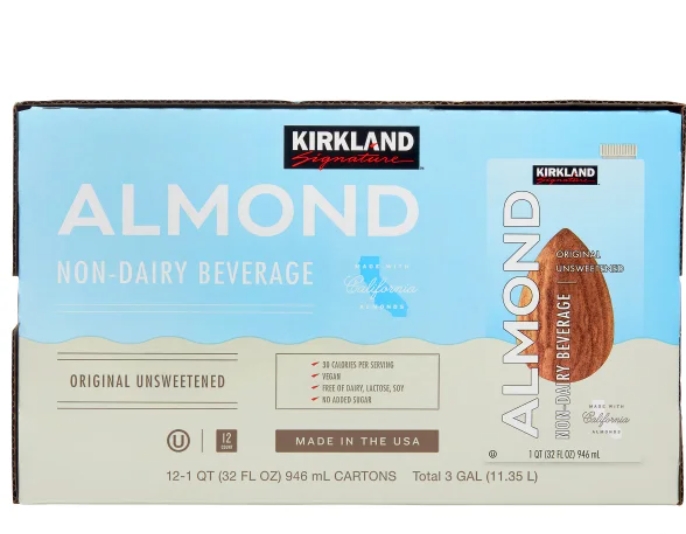
Kirkland Signature, Almond Milk, 1 qt, 12-count
- Kosher
- Vegan
- Free of Dairy, Lactose, Soy
- No Added Sugar
- Made in the USA
Your Complete Resource for Costco’s Popular Plant-Based Beverage
In a world where plant-based alternatives have moved from niche to mainstream, almond milk stands as one of the most popular dairy substitutes on supermarket shelves. Among the many brands competing for consumer attention, Kirkland Signature Almond Milk has established itself as a leading choice for value-conscious shoppers seeking quality without compromise. This comprehensive guide explores everything you need to know about this Costco staple—from ingredients and nutrition to practical applications and environmental considerations.
The Rise of Almond Milk in American Households
Before diving into the specifics of Kirkland’s offering, it’s worth noting how almond milk has transformed from an alternative product to a household staple. The shift toward plant-based eating, concerns about lactose intolerance, and environmental considerations have all contributed to almond milk’s popularity surge over the past decade. Costco, with its commitment to offering quality products at competitive prices, has positioned its Kirkland Signature brand to meet this growing demand.
What’s Actually in Your Kirkland Almond Milk?
When you’re pouring that creamy beige liquid into your morning coffee or smoothie, you might wonder exactly what you’re consuming. Kirkland Signature Almond Milk keeps its ingredient list relatively straightforward compared to some competitors.
The base ingredients typically include filtered water and almonds (usually around 2%), which form the foundation of the product. To improve texture and prevent separation, the brand uses gellan gum, a plant-based thickener that’s generally considered safe. You’ll also find sea salt in minimal amounts for flavor enhancement.
What sets Kirkland’s formulation apart is what it doesn’t include. Unlike some almond milk brands that rely on carrageenan (a controversial seaweed-derived thickener that some studies have linked to digestive issues), Kirkland Almond Milk is carrageenan-free, making it a preferable choice for those with sensitive digestive systems or concerns about this ingredient.
The unsweetened variety contains no added sugars, while the vanilla-flavored version includes cane sugar and natural flavors. Both versions are fortified with essential nutrients, including calcium carbonate, vitamin E, vitamin A palmitate, vitamin D2, and vitamin B12—additions that help compensate for nutrients naturally found in dairy milk.
Sweet or Not? Understanding Kirkland’s Flavor Varieties
For those monitoring their sugar intake, Kirkland offers both unsweetened and vanilla-flavored options. The unsweetened version contains no added sugars, making it ideal for those following keto, low-carb, or sugar-restricted diets. With less than 1 gram of sugar per serving, this variety lets the subtle, natural nuttiness of the almonds shine through.
The vanilla flavor adds a touch of sweetness and aromatic vanilla notes, making it more appealing to those transitioning from dairy milk or using it in sweeter applications like cereal or desserts. This version does contain added cane sugar, so it’s worth checking the nutritional panel if you’re watching your sugar intake.
While Kirkland’s almond milk lineup isn’t as extensive as some specialty brands that offer chocolate, strawberry, or barista blends, the two core offerings—unsweetened and vanilla—satisfy the needs of most consumers seeking a versatile plant milk option.
The Costco Value Proposition: Price Point Analysis
One of the most compelling aspects of Kirkland Almond Milk is its value proposition. At approximately $8-10 for a 6-pack of 32-ounce containers (prices may vary by location and over time), it offers significant savings compared to leading national brands like Silk or Blue Diamond, which often retail for $3-4 per single container at standard grocery stores.
This price advantage becomes even more pronounced when considering the quantity. The typical package provides 192 ounces of almond milk—enough to last an average household several weeks. For families that have embraced almond milk as their primary dairy alternative, these savings can add up to hundreds of dollars annually.
The cost-effectiveness extends beyond the sticker price. The shelf-stable packaging means you can stock up without worrying about refrigerator space until after opening, reducing shopping trips and potentially saving on transportation costs. When it comes to value, Kirkland Almond Milk exemplifies Costco’s core philosophy of providing quality products at prices that benefit the consumer.
Organic or Conventional: What’s the Status?
For the environmentally and health-conscious consumer, organic certification often serves as a purchasing guideline. Currently, Kirkland Signature Almond Milk is not certified organic. The almonds used in production are conventionally grown rather than meeting the strict requirements for organic certification.
This non-organic status is reflected in the pricing—organic almond milk typically commands a premium of 30-50% over conventional options. By offering a conventional product, Kirkland provides an accessible price point for more consumers while maintaining quality standards.
For shoppers prioritizing organic products, this may be a consideration. However, it’s worth noting that Costco does regularly evaluate its product offerings based on consumer demand, and an organic version could potentially appear in the future if market trends indicate sufficient interest.
Nutritional Breakdown: What’s in Your Glass?
Understanding the nutritional profile of Kirkland Almond Milk helps consumers make informed decisions about incorporating it into their diet. A typical 8-ounce serving of the unsweetened variety contains:
- Calories: 30-35
- Fat: 2.5g (primarily healthy unsaturated fats)
- Sodium: 150mg
- Carbohydrates: 1g
- Fiber: <1g
- Sugars: 0g
- Protein: 1g
The fortification process adds significant nutritional value, with each serving providing:
- Calcium: 45% of Daily Value
- Vitamin E: 50% of Daily Value
- Vitamin A: 10% of Daily Value
- Vitamin D: 25% of Daily Value
- Vitamin B12: 50% of Daily Value
This nutritional profile makes Kirkland Almond Milk significantly lower in calories than whole dairy milk (which contains about 150 calories per serving) and even lower than skim milk (about 80 calories per serving). The protein content is lower than dairy milk’s 8g per serving, which is a consideration for those relying on milk as a protein source.
The calcium fortification is particularly important, as it helps plant-based milk consumers maintain adequate calcium intake without dairy products. The vitamin D and B12 fortification also benefits those on plant-based diets, as these nutrients can be challenging to obtain from plant sources alone.
Dietary Considerations: Gluten, Vegan, and More
For those with specific dietary needs or preferences, Kirkland Almond Milk offers several advantages. It is gluten-free, making it suitable for individuals with celiac disease or gluten sensitivity. The product is also completely vegan, containing no animal-derived ingredients in either its composition or processing.
The unsweetened variety is keto-friendly due to its very low carbohydrate content (1g per serving), fitting well within the strict carbohydrate limitations of ketogenic diets. This version is also compatible with most low-carb, paleo, and Whole30 eating plans.
Allergy considerations are important to note: while Kirkland Almond Milk is free from dairy, soy, and gluten, it obviously contains tree nuts (almonds) and is processed in facilities that may handle other allergens. Those with severe tree nut allergies should avoid this product.
From Morning Coffee to Baked Goods: Versatility in the Kitchen
The practical applications of Kirkland Almond Milk extend throughout the kitchen, making it a versatile staple for many households. Its performance in different culinary contexts varies, with some applications better suited than others.
For coffee and tea enthusiasts, Kirkland Almond Milk offers a mixed experience. While it does lighten coffee effectively, it doesn’t provide the same creamy mouthfeel as dairy milk or some barista-specific plant milks. It tends to separate in very hot beverages unless constantly stirred or frothed. The unsweetened variety works better in coffee for those who prefer to control their own sweetness level.
In smoothies and cold beverages, Kirkland Almond Milk shines. Its neutral flavor profile in the unsweetened version allows other ingredients to take center stage, while the vanilla option can enhance fruit flavors without overwhelming them. The lower calorie content compared to dairy milk can also be advantageous for those using smoothies as meal replacements or watching their caloric intake.
Baking with Kirkland Almond Milk produces generally good results, though some adjustments may be necessary. Its lower protein content means it doesn’t contribute to structure the way dairy milk does, so recipes requiring significant protein content (like some breads) may need modification. However, for most cakes, muffins, and quick breads, it serves as an excellent one-to-one substitute.
For creamy applications like puddings and custards, Kirkland Almond Milk can work well with the addition of a little extra thickener (such as cornstarch or flour) to compensate for its thinner consistency compared to whole milk or cream.
Storage and Shelf Life: Maximizing Longevity
One of the greatest practical advantages of Kirkland Almond Milk is its shelf stability before opening. Packaged in aseptic cartons, unopened containers can remain shelf-stable for months—typically 7-10 months from the manufacturing date printed on the package.
This extended shelf life comes from the ultra-high temperature (UHT) processing method used, which sterilizes the product before packaging in a sterile environment. The ability to store Kirkland Almond Milk in your pantry until needed represents a significant convenience factor, especially for those with limited refrigerator space or who like to stock up on essentials.
Once opened, refrigeration is required, and the product should be consumed within 7-10 days for optimal freshness and food safety. A quick shake before pouring is recommended, as natural separation can occur even with the stabilizers present.
If you find yourself with more almond milk than you can use before expiration, freezing is an option, though it may affect the texture slightly upon thawing. Using frozen-then-thawed almond milk in cooking rather than drinking straight provides the best results.
Taste Test: How Does Kirkland Stack Up Against Competitors?
Flavor is subjective, but consumer reviews and blind taste comparisons offer some consensus on how Kirkland Almond Milk compares to competitors. The unsweetened variety tends to receive praise for its clean, mild almond flavor without the bitter aftertaste some brands exhibit. Its texture is described as middle-of-the-road—not as watery as some budget options but not as creamy as premium or barista-focused varieties.
The vanilla flavor generally receives positive reviews for its balanced sweetness that enhances rather than overwhelms the almond base. Some consumers note that it has a more natural vanilla taste compared to the sometimes artificial-tasting notes in competing products.
When compared directly with market leaders like Silk and Blue Diamond, Kirkland often scores similarly on taste while outperforming on price. It typically doesn’t match the richness of premium brands like Califia Farms or specialty barista blends, but considering the price differential, many consumers find it offers excellent value.
Consumer feedback consistently highlights that Kirkland’s formulation has improved over the years, with earlier versions being criticized for watery consistency—a complaint that appears less frequently in recent reviews.
Environmental Considerations: The Almond Milk Footprint
The environmental impact of almond milk production has received increased scrutiny in recent years, particularly regarding water usage in almond cultivation. Almonds require significant water to grow—approximately 1.1 gallons of water per almond—and are primarily grown in drought-prone California.
While Kirkland doesn’t specifically market its almond milk as environmentally friendly, the product does offer some environmental advantages over dairy milk. Even with the water-intensive nature of almond growing, studies indicate that almond milk production generates fewer greenhouse gas emissions and requires less land than dairy milk production.
The packaging—aseptic cartons—is recyclable in many communities, though recycling capabilities for these multi-layer containers vary by location. Costco’s bulk packaging approach (six cartons bundled together) reduces overall packaging material compared to purchasing individual cartons.
For the environmentally conscious consumer, it’s worth noting that while almond milk isn’t the most eco-friendly plant milk (oat and soy typically have lower environmental impacts), it still represents a significant improvement over dairy milk in terms of carbon footprint and resource utilization.
Availability: Where to Find Kirkland Almond Milk
As a Kirkland Signature product, this almond milk is primarily available at Costco warehouse locations. The warehouse club’s membership requirement means access requires either a personal membership or shopping with a member.
For those seeking online purchasing options, Costco.com sometimes offers Kirkland Almond Milk for delivery, though availability may vary by location. Additionally, third-party delivery services like Instacart provide Costco delivery in many areas, potentially including Kirkland Almond Milk, though often at a premium over in-store prices.
It’s worth noting that unlike some Kirkland Signature products that have made their way to Amazon, Kirkland Almond Milk is generally not officially distributed through non-Costco channels. Products appearing on other marketplaces may be resold at significant markups or may not be genuine.
The Consumer Verdict: Reviewing the Reviews
Aggregating consumer feedback from various sources including Costco’s website, social media discussions, and food review blogs reveals a generally positive consensus about Kirkland Almond Milk. The product typically earns ratings between 4 and 4.5 out of 5 stars, with value consistently identified as the strongest selling point.
Positive reviews frequently mention:
- Excellent price-to-quality ratio
- Good taste with minimal aftertaste
- Versatility in cooking applications
- Appreciation for the carrageenan-free formulation
- Convenient packaging and storage
Critical feedback tends to focus on:
- Thinner consistency compared to some premium brands
- Occasional separation in coffee
- Limited flavor options compared to competitors
- Some consumers desiring organic options
The most telling statistic may be the repurchase rate—across review platforms, a significant majority of reviewers indicate they buy the product repeatedly, suggesting satisfaction extends beyond initial impressions.
Making the Most of Your Kirkland Almond Milk
To maximize your experience with this popular product, consider these practical tips from regular consumers:
For the best coffee experience, try warming the almond milk slightly before adding it to hot coffee to reduce separation. Some users recommend a small, inexpensive milk frother to create a more cafe-like experience.
In smoothies, freezing almond milk in ice cube trays creates convenient portions that can replace regular ice, resulting in a creamier, less diluted smoothie.
For a richer experience in recipes calling for milk, some consumers replace a quarter of the required almond milk with coconut cream or cashew cream, maintaining the dairy-free status while enhancing creaminess.
To prevent waste if you can’t consume an entire carton within the 7-10 day open refrigeration window, consider portioning the remainder into smaller containers and freezing for future cooking use.
The Bottom Line: Is Kirkland Almond Milk Worth It?
After examining ingredients, nutrition, taste, versatility, and value, the comprehensive picture of Kirkland Signature Almond Milk emerges as a product that effectively balances quality and affordability. While it may not offer the premium experience of some specialty brands or the organic certification some consumers seek, it provides reliable performance at a price point that makes plant-based living more accessible.
For Costco members already making regular warehouse visits, the value proposition becomes even stronger, eliminating the need for special trips to purchase alternative milk products.
The success of Kirkland Almond Milk ultimately lies in its ability to deliver what matters most to the majority of consumers: a good-tasting, versatile, allergen-friendly milk alternative that doesn’t break the budget. This balance of attributes has earned it a permanent place in many households’ refrigerators and pantries.
Whether you’re new to plant-based milks or a seasoned dairy alternative enthusiast, Kirkland Signature Almond Milk offers a compelling option worth considering on your next Costco run. With its combination of clean ingredients, nutritional benefits, and unbeatable value, it represents what the Kirkland Signature line does best—making quality accessible to the everyday consumer.
As consumer preferences continue to evolve and the plant-based market matures, Kirkland’s offering may well adapt too. But for now, it stands as a testament to how mainstream dairy alternatives have become—no longer niche products with premium price tags, but everyday staples deserving of a place in the shopping carts of value-conscious consumers everywhere.




